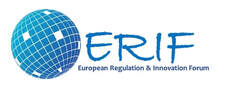The European Regulation and Innovation Forum (ERIF) is an independent, not-for-profit think tank in Brussels that aims to promote the adoption by the EU’s institutions of world-leading standards of regulatory decision-making, encompassing governance, scientific integrity, and decision-making from inception, through design. legislation, and implementation, to ex post evaluation.
The origins of the ERIF go back to the early 1990s, when a small group of thought leaders and business representatives from a wide variety of industrial sectors met to discuss new developments in the use of cost-benefit analysis and risk assessment when managing risks. This was a period when many governments throughout the OECD area, were exploring new ways to improve the quality of regulatory decision-making, and began establishing rules for assessing the regulatory impact of new regulations. In the European Union, this was quite novel at the time.
Known previously as the European Risk Forum, the ERIF is a registered Association Sans But Lucratif since 2013. More information about the origins of the ERIF is available here.
Over the years, the think tank has successfully championed many key developments in the Better Regulation Strategy of the European Union, including
The origins of the ERIF go back to the early 1990s, when a small group of thought leaders and business representatives from a wide variety of industrial sectors met to discuss new developments in the use of cost-benefit analysis and risk assessment when managing risks. This was a period when many governments throughout the OECD area, were exploring new ways to improve the quality of regulatory decision-making, and began establishing rules for assessing the regulatory impact of new regulations. In the European Union, this was quite novel at the time.
Known previously as the European Risk Forum, the ERIF is a registered Association Sans But Lucratif since 2013. More information about the origins of the ERIF is available here.
Over the years, the think tank has successfully championed many key developments in the Better Regulation Strategy of the European Union, including
- the design and scope of the Commission’s impact assessment system;
- the establishment of its oversight and scientific advice bodies (currently the Regulatory Scrutiny Board and the Group of Chief Scientific Advisers), and
- the introduction of the 'Innovation Principle'.
